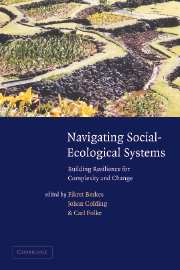Book contents
- Frontmatter
- Contents
- List of contributors
- Preface
- Acknowledgements
- Foreword: The backloop to sustainability
- 1 Introduction
- Part I Perspectives on resilience
- Part II Building resilience in local management systems
- Part III Social-ecological learning and adaptation
- 8 Exploring the role of local ecological knowledge in ecosystem management: three case studies
- 9 Facing the adaptive challenge: practitioners' insights from negotiating resource crises in Minnesota
- 10 Caribou co-management in northern Canada: fostering multiple ways of knowing
- Part IV Cross-scale institutional response to change
- Index
- References
9 - Facing the adaptive challenge: practitioners' insights from negotiating resource crises in Minnesota
Published online by Cambridge University Press: 13 August 2009
- Frontmatter
- Contents
- List of contributors
- Preface
- Acknowledgements
- Foreword: The backloop to sustainability
- 1 Introduction
- Part I Perspectives on resilience
- Part II Building resilience in local management systems
- Part III Social-ecological learning and adaptation
- 8 Exploring the role of local ecological knowledge in ecosystem management: three case studies
- 9 Facing the adaptive challenge: practitioners' insights from negotiating resource crises in Minnesota
- 10 Caribou co-management in northern Canada: fostering multiple ways of knowing
- Part IV Cross-scale institutional response to change
- Index
- References
Summary
Introduction
The chapter draws lessons and insights from interviews with practicing resource managers involved in leading diverse groups of primary interest groups through resource management crises and change. Each of these management efforts was perceived by the interviewed practitioners and others as experimenting with new ways to recouple and renew social–ecological systems. They represent a nested set of local and regional experiments within one organizational context, a state resource management agency that was intentionally trying to reorganize through novel approaches to management and citizen involvement (Fig. 9.1). All of the cases profiled were characterized by involvement of multiple stakeholders with competing interpretations, values, and goals for the resource system, and reflected a conscious design to engage citizens in creating alternative platforms for resource negotiation (Woodhill and Röling, 1998). In each case, practitioners were experimenting with learning to function differently, outside traditional norms of leadership.
The goal of this study was to identify management practices and frameworks that are founded on knowledge and understanding of dynamics in both human and ecological systems, and to identify the key elements contributing to adaptive response. In this chapter, we develop a matrix based on the release and reorganization phases of the Holling adaptive cycle in an attempt to classify the ‘tacit understanding,’ or intuitive guiding principles, which emerged in interviews. Practitioners articulated principles loosely, drawing metaphors from systems theory and chaos theory, organization and change management, and ecosystem management.
- Type
- Chapter
- Information
- Navigating Social-Ecological SystemsBuilding Resilience for Complexity and Change, pp. 210 - 240Publisher: Cambridge University PressPrint publication year: 2002
References
- 2
- Cited by



